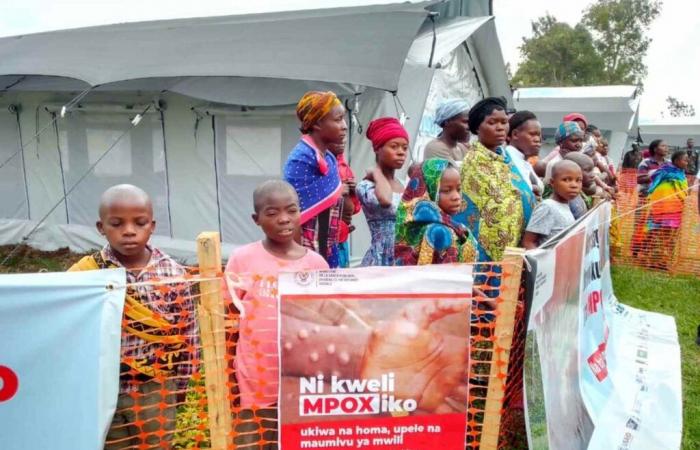Epidemiological context of Mpox in the DRC
he Mpox, formerly known as monkeypox, is a viral disease that occurs mainly in tropical areas of central and west Africa. There are two clades of the virus: clade I (including subclades Ia and Ib) and clade II (including subclades IIa and IIb). The DRC is particularly affected by clade Ib, which has a higher mortality rate.
The current epidemic in the DRC is partly attributed to poor health infrastructure and the prevalence of close contact between humans and animals carrying the virus. Indeed, Mpox is a zoonosis, which means that it can be transmitted from animals to humans, particularly by primates and rodents, in areas where interactions with these animals are frequent, particularly in activities such as hunting and breeding. Human-to-human transmission, for its part, occurs through direct contact with skin lesions, bodily fluids or contaminated objects, which makes management of the epidemic complex in areas with high population density.
Launch of vaccination: a relief for the population
In September 2024, the DRC received approximately 265,000 doses of vaccines, supplied by HERA via Africa CDC, USAID, and Gavi, to try to stem this outbreak. These doses were distributed across 12 health zones, several of which are seriously affected, including the province of North and South Kivu. The latter is particularly vulnerable due to its population density and limited health infrastructure. The town of Uvira, located in this province, is one of the nerve centers for vaccination.
“We were told the vaccine was coming and it would be important to get vaccinated because we are vulnerable. Today, I am vaccinated and that reassures me. »
The launch of this vaccination campaign is seen as a relief for a population already facing several health crises, notably Ebola and Covid-19. Vaccination sites were quickly stormed, particularly by groups identified as particularly at risk, such as caregivers and certain communities exposed to regular interactions with carriers of the virus.
“In our work, we meet many people. Some of them can be affected by Mpox and contaminate us too,” explains a sex worker who wished to remain anonymous at the Uvira general hospital, after receiving her vaccine. “We were told the vaccine was coming and it would be important to get vaccinated because we are vulnerable. Today, I am vaccinated and that reassures me. »
An expected vaccine, but major logistical challenges
The vaccine used in this campaign, of the live attenuated type, is derived from that against human smallpox, which makes it an effective weapon against Mpox. However, the doses remain insufficient given the scale of the epidemic and the geographical coverage of the country. Vaccine distribution is particularly difficult in the DRC, where infrastructure such as the cold chain is often in poor condition, making access to populations in rural or remote areas very complicated.
Credit: Ricky Ombeni
Alphonse Mufariji, a civil society actor, shares both his relief and his frustrations: “We are happy that the government has taken measures to protect the population. There are still many people to be vaccinated in hard-to-reach areas. The vaccine is here, but we must now ensure that everyone can benefit from it. »
The response of health authorities and the international community
The Congolese government, with the support of international partners such as the WHO and the Africa CDC, has put in place several strategies to accelerate the response to the epidemic. In addition to vaccination, awareness campaigns on preventive measures have been organized, particularly in areas where access to care is limited. Authorities encourage people to limit contact with wild animals and to promptly report any suspected cases.
Dr Nanou Yanga, head of Mpox vaccination within the Expanded Program on Immunization (EPI), highlights the efforts made to curb the transmission of the virus. “The disease itself makes the population aware of the need to protect themselves. Unfortunately, we do not yet have enough vaccines to cover everyone, so we are focusing our efforts on vaccinating key populations, direct and indirect contacts of infected people, in order to break the chain of transmission. »
“We have overcome many challenges, from polio to Ebola to Covid-19. With vaccination and the efforts made, we hope to see the end of this Mpox epidemic. »
At the same time, the authorities are calling for increased mobilization of the international community in order to obtain additional doses and strengthen local logistical capacities.
Healthcare workers on the front line
Caregivers, on the front line of the fight against this epidemic, are among the first people to receive the vaccine. Many expressed relief, but also concern about the scale of the epidemic. “Recently we lost a nursing colleague who died from Mpox. His death shocked us all,” says Rachid Ndakundi, president of the Uvira nurses. “With the vaccine we feel better protected, but it is crucial that all health personnel are vaccinated quickly to avoid further losses. »
Imani Nakagoje, another nurse working at an Mpox treatment center in Uvira, says: “When the outbreak started, we didn’t know how we were going to treat patients without putting our lives in danger. Now that the vaccine is here, we have hope that we can contain the situation, as was done for COVID-19. »
Interdisciplinary strategies to reach populations at risk
In Uvira, as in other affected areas, teams from the Expanded Vaccination Program are deployed to target populations, despite limited quantities of doses. “We have eight teams at the vaccination site, responsible for covering the entire health zone by identifying people at risk. In addition to welcoming those who come to the health center to be vaccinated, our teams travel to places where the target populations are larger,” explains Dr. Nimi Panzu, chief medical officer of the Uvira zone.
To strengthen their approach, interdisciplinary strategies have been implemented to reach the entire targeted population. Dr Nanou specifies: “As part of this campaign, we took advantage of the structures of the National AIDS Control Program and the National Multisectoral AIDS Control Program to better achieve our targets. We also work in collaboration with the animal health program to reach other vulnerable groups, such as pastoralists, fishermen, hunters and eco-guards. »
A long-term fight against Mpox
Mpox is now classified as a public health emergency of international concern by the WHO and as a priority threat by Africa CDC and Gavi, implying that the fight against this disease is not limited to a simple reactive response. The DRC, with the support of its international partners, hopes to acquire other doses of vaccines and strengthen its epidemiological surveillance capacities to contain the epidemic in the long term.
In the meantime, the affected populations remain hopeful. “We have overcome many challenges, from polio to Ebola to Covid-19. With vaccination and the efforts made, we hope to see the end of this Mpox epidemic,” concludes a resident of Uvira.
Joining efforts for effective and sustainable continental coordination: Gavi’s involvement
As the Mpox epidemic rages across Central and West Africa, Gavi, the Vaccine Alliance, is supporting the continental response by deploying personnel on the ground, whether at the level of overall coordination of the response or directly in the DRC, to unite the efforts of different actors and support the response. For Dr Marthe Sylvie Elouma Essengue, Regional Director, Central and West Africa at Gavi, this approach aims as much to manage the current crisis as to contribute to building resilient health systems, capable of coping with future epidemics: “ This is the first time Gavi has deployed staff for a direct response. This allows us to work more effectively with other partners and to strengthen a rapid, complementary response adapted to local needs, which change depending on the evolution of the epidemic. »
One of the pillars of this resilience is the strengthening of epidemiological surveillance and the involvement of community stakeholders in surveillance, detection of cases and their follow-up. In the DRC, Gavi contributes to improving the health information system by providing the subnational level with digital tools, allowing faster collection and reporting of information as well as contact tracing. “Improving the collection of quality data is essential to respond effectively, interrupt transmission and prevent future crises,” said Cyril Nogier, Gavi country manager for the DRC.
Community engagement is also at the heart of this integrated strategy. Gavi supports local health workers, who play a key role, both in responding to outbreaks and in routine immunization in catching up to zero doses of children. “This strengthening of community engagement, if it works in normal times and during epidemics, contributes to strengthening the resilience of health systems,” he specifies.
Finally, while supporting vaccination which helps interrupt the epidemic, Gavi is also interested in the continuity of vaccination services during the response to the Mpox epidemic. Efforts have been made in recent years by Gavi and other partners, including the World Bank, to strengthen the cold chain to accommodate routine activities and ongoing vaccination campaigns. “It is crucial that other essential health services are not sacrificed,” believes Cyril Nogier.
By coordinating its actions with regional health partners such as WHO, Africa CDC, UNICEF, Global Fund, African Development Bank, World Food Program, International Office of Migration, Doctors without borders and other partners, Gavi wants to use the opportunity of this Mpox epidemic to build stronger health systems in countries that are better prepared to respond to future health emergencies.
Follow the author on X/Twitter: @PatrickKahondwa






